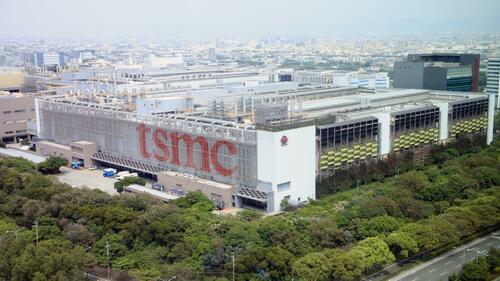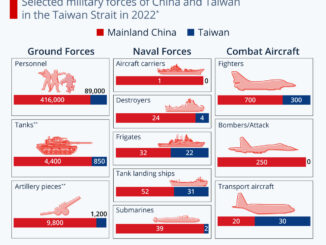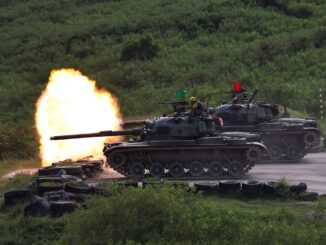
The global semiconductor industry is entirely dominated by Taiwan. And that is a significant security risk for Western countries if China were to invade the island nation.
“If you allow yourself to think about a scenario where the United States no longer had access to the chips currently being made in Taiwan, it’s a scary scenario.
“It’s a deep and immediate recession. It’s an inability to protect ourselves by making military equipment. We need to make this in America,” US Commerce Secretary Gina Raimondo told CNBC this past summer.
In August, US House Speaker Nancy Pelosi made a controversial trip to Taiwan. In one of her meetings, Taiwan Semiconductor Manufacturing Co. founder Morris Chang told Pelosi very bluntly that Washington’s efforts to rebuild domestic chip manufacturing would fail.
“He was pretty blunt, and the esteemed guests were a bit surprised,” one person familiar with the talks told Financial Times.
As tensions between Taiwan and China mount, Washington plans to shift the global semiconductor supply chain out of the region to the US and elsewhere. And the reason for it is due to a scenario where China invades or blockades Taiwan, which would mean the global chip industry would grind to a halt overnight.
“If China cuts off TSMC’s supply chain, it could cause a major crisis in the world economy,” said Paul Clifford, a non-resident fellow at Harvard’s Kennedy School. TSMC is moving toward shifting “some of their production out of Taiwan because of that concern.”
Jason Hsu, a former Taiwanese lawmaker and now a senior fellow at the Harvard Kennedy School, said the US is playing a delicate balancing act by pressuring TSMC to move production lines to the US while it unleashes an economic war on China’s semiconductor industry. He said that puts Taiwan at risk.
The West’s concerns around Taiwan’s security and independence are why the Biden administration is pursuing the CHIPS Act to expand domestic semiconductor output. One problem for TSMC is that Washington is beginning to diversify chip manufacturing away from Taiwan.
For example, the Pentagon’s dependency on Taiwan for chips that power leading-edge devices and weapons is central to the battle for tech supremacy between the US and China. Due to future disruption risks, the DoD has to source chips from more secure supply chains.
Besides the US, there are efforts in Europe, Japan, Singapore, and India to increase semiconductor manufacturing. New manufacturing plants could take a couple of years to start producing chips.
The West’s strategy to diversify semiconductor supply chains out of Taiwan is becoming more clear:
“Everyone realizes that there is a big watershed moment here for the whole industry,” said Peter Hanbury, a partner and expert in semiconductor and technology supply chains at Bain, the consultancy. “But it kind of snuck up on people.”
Credit Suisse analysts recently pointed out if Taiwan’s chip plants were disrupted for any reason. The production of automobiles to computers would be severely impacted.
As of right now, the West’s goal is to break up Taiwan’s chip hub, though, as we noted earlier, TSMC’s Chang warned that any such move would fail.
However, TSMC customers are already looking to diversify production out of the region, as explained by Sebastian Hou, managing director at Neuberger Berman, an investment management company:
“There have been some concerns among TSMC customers since two years ago … It was the time when in Taiwan we started to have more fighter jets from China hovering around the Taiwan Strait, and that has become a daily routine.”
So far, those customers include Qualcomm and Nvidia, who have recently stated that some chip production from TSMC’s facilities would be shifted elsewhere.
Hanbury said the big question would be if Apple changes manufacturing partners due to the increasing risks in the Taiwan Strait.
“Taiwan’s monopoly in semiconductor production creates instability,” Brad Martin, director of the National Security Supply Chain Institute at the Rand Corporation, said. “If the US is faced with a need to make a decision between protecting its economy and defending Taiwan, that starts to become a very stark decision.”
It’s becoming increasingly clear that the West wants TSMC and others in Taiwan to shift chip production elsewhere, so chip supplies aren’t drastically disrupted in the event of a China invasion.



